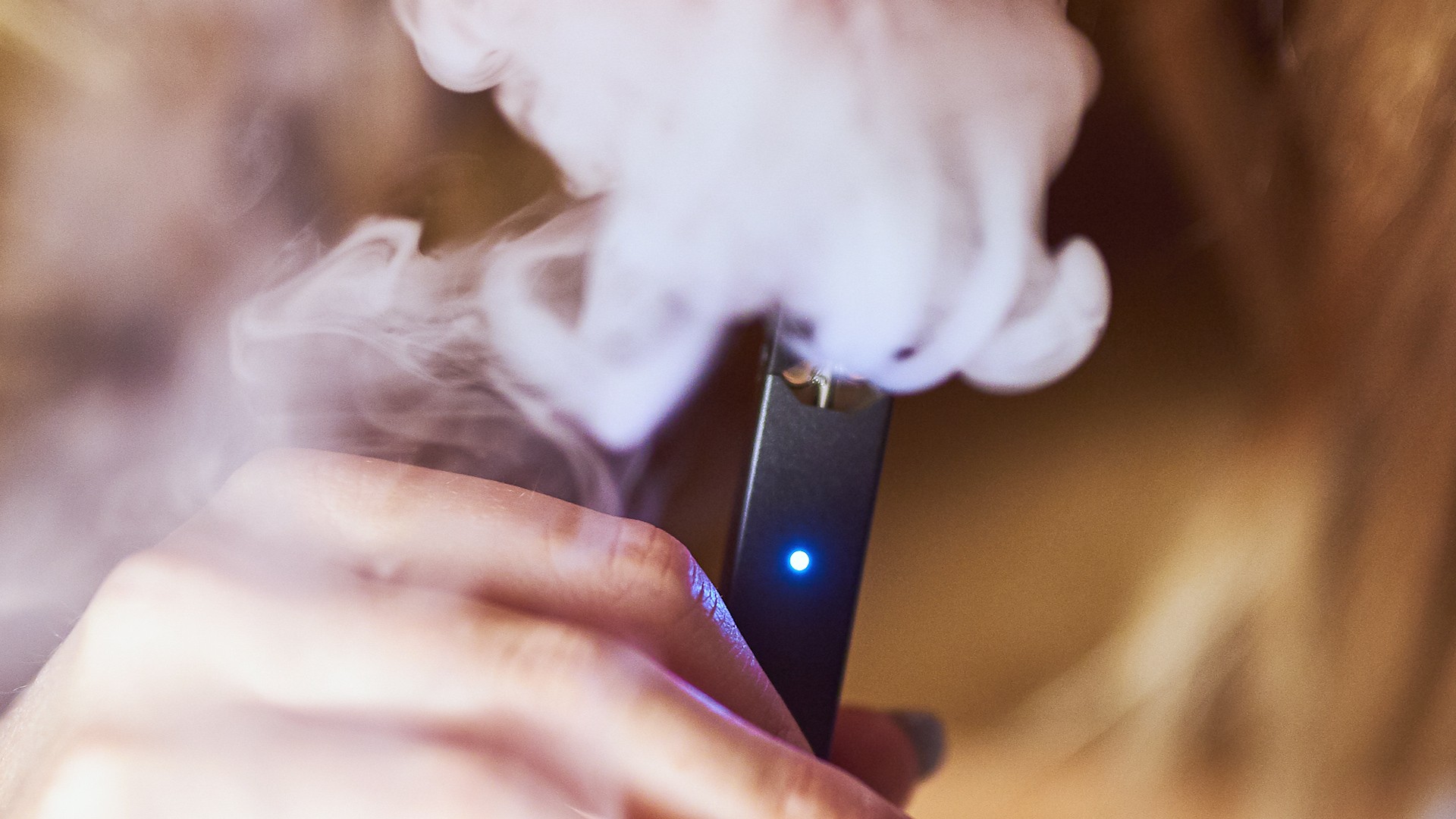Left Image: Photo by EVA HAMBACH / AFP/Getty Images. Right Image: Photo by Axel Heimken/picture alliance via Getty Images.
Like the origin story of many technology upstarts, JUUL's is set to be enshrined in myth.It was sort of like creating a social network in a Harvard dorm room, except here it was two Stanford graduate students, James Monsees and Adam Bowen, who said they thought of it while they took cigarette breaks on campus. (The pair first developed a vaporizer, under the auspices of Pax Labs, that is now catered toward weed.)"Look, [cigarette] smoking hasn't evolved in 100 years," Bowen told Fast Company last winter. "It's killing millions of people. We're at the risk of suffering the same fate, and we want to work on this: How do you create a new ritual to replace the old one?"

Since their signature nicotine product went to market in 2015, just like so many other players at the intersection of tech and big business, JUUL has come to face the inevitable need to "pivot." As the Wall Street Journal recently reported, the company has been planning to cut some 500 jobs by the end of 2019 as it braces for a federal flavor ban on vaping products—and as it prepares an application for official recognition by the Food and Drug Administration (FDA). That coveted stamp of official approval is what's known as a premarket tobacco product application, or PMTA. It's the type of regulatory OK traditional businesses might be certain to get before going to market, but that 21st-century tech companies like Uber and JUUL often don't bother with.The same day the layoff news broke, BuzzFeed News reported that a former JUUL executive, Siddharth Breja, alleged in a lawsuit that the company's previous leadership shipped out contaminated and year-old pods, and that he was let go in retaliation for raising objections after the fact. JUUL has called these claims "baseless." What, exactly, Breja alleges those rogue pods were contaminated with, and whether they had anything to do with vaping-linked illnesses that broke out across the country in recent months and have mostly been tied to THC carts, was not clear.Conversations with industry insiders suggested staff turnover and recrimination may have been inevitable given the infusion of Big Tobacco money (and executives) into JUUL's once-highfalutin DNA as its star rose, young people got hooked, and vape-tied health problems came to light."This is relatively expected considering what I assume are declining sales, and also probably an effort to 'clean house' of executives who presided during the public-health crisis and so-called epidemic," said Azim Chowdhury, an attorney who has represented the vaping industry for more than a decade.Are you a current or former JUUL employee, or do you know something about the company or vaping industry that we should? Using a non-work device, you can contact Alex Norcia securely via Signal at 201-429-7024 or email at alex.norcia@protonmail.com.According to the Journal, JUUL was hiring as many as 300 employees per month earlier this year, and the size of the staff had reached 4,000 or so in total. Then came September, when K.C. Crosthwaite, the newly minted CEO and former executive at Altria—a parent company of Philip Morris USA that invested in JUUL—presided over a job freeze at the peak of the vaping crisis."JUUL is in a fight for its survival and the breed of people they need to hire today differs from one or two years ago," said Gregory Conley, the president of the industry-supporting American Vaping Association.Along with those expected layoffs, JUUL has announced an internal reorganization, a restructuring that has more departments reporting straight to fresh-faced Joe Murillo, the chief regulatory officer and another Altria veteran, and a new team that will consolidate several others under the umbrella of "product.""As the vapor category undergoes a necessary reset," Crosthwaite said in a statement, "this reorganization will help JUUL Labs focus on reducing underage use, investing in scientific research, and creating new technologies while earning a license to operate in the U.S. and around the world."But this "reset" will not be as easy as getting an overloaded website back online.Over the last few months, whatever you believe happened to Monsees and Bowen's allegedly noble idea has been a source of debate, as regulators and health experts have attempted to figure out if JUUL's earliest motives—a seemingly sincere attempt to combat smoking combustible cigarettes, the number-one cause of preventable disease in the world—took an ominous turn. Did leadership make cynical decisions to target underage users for profit? Did JUUL just get too large, too fast? (The company has long denied that it tried to explicitly appeal to teenagers.)What we do know is vape-related illnesses exploded this summer, and that, around the same time, JUUL underwent a public-relations nightmare. Congressional hearings. Criminal probes. Rulings that it broke some federal regulations. Accusations that it explicitly targeted teens with its products. In short, it needed help.With the change in leadership, it's safe to assume the company's culture is changing, too. The fact that Crosthwaite, the CEO, and Murillo, the head of regulatory affairs, spent a significant portion of their careers at Altria has only further led skeptics and critics of the vape giant to believe the company is slowly being taken over by Big Tobacco. Or, from another point of view, that JUUL had to sell out to the very industry it had been fighting, only so it could save itself. Altria, of course, knows its way around a federal regulator, and with tobacco sales declining, found a technology to invest in and keep its dwindling influence intact. Much now rides on the fate of that FDA application.If it's approved, JUUL's value could skyrocket. If it fails, well, JUUL could become another startup that got too hot for its own good.Correction 10/31/2019: Because of an editing error, a previous version of this story said Altria was a subsidiary of Philip Morris USA, rather than the reverse. We regret the error.Sign up for our newsletter to get the best of VICE delivered to your inbox daily.Follow Alex Norcia on Twitter.
Advertisement

Since their signature nicotine product went to market in 2015, just like so many other players at the intersection of tech and big business, JUUL has come to face the inevitable need to "pivot." As the Wall Street Journal recently reported, the company has been planning to cut some 500 jobs by the end of 2019 as it braces for a federal flavor ban on vaping products—and as it prepares an application for official recognition by the Food and Drug Administration (FDA). That coveted stamp of official approval is what's known as a premarket tobacco product application, or PMTA. It's the type of regulatory OK traditional businesses might be certain to get before going to market, but that 21st-century tech companies like Uber and JUUL often don't bother with.The same day the layoff news broke, BuzzFeed News reported that a former JUUL executive, Siddharth Breja, alleged in a lawsuit that the company's previous leadership shipped out contaminated and year-old pods, and that he was let go in retaliation for raising objections after the fact. JUUL has called these claims "baseless." What, exactly, Breja alleges those rogue pods were contaminated with, and whether they had anything to do with vaping-linked illnesses that broke out across the country in recent months and have mostly been tied to THC carts, was not clear.
Advertisement
Advertisement
Advertisement
